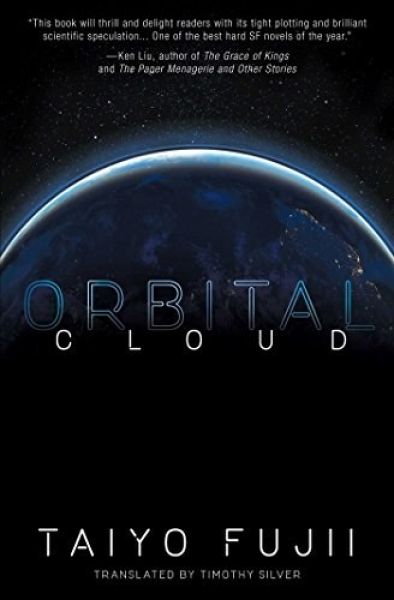‘Cause Two Can Keep a Secret If One of Them is Dead
Orbital Cloud
By Taiyo Fujii (Translated by Timothy Silver)

4 Apr, 2017
0 comments
Taiyo Fujii’s Orbital Cloud is a standalone science fiction thriller. Originally published in 2014 under the title Ōbitaru Kuraudo, Orbital Cloud was translated into English by Timothy Silver. The Haikasoru edition was published in March 2017.
Even in 2020, putting objects into orbit is still the domain of national governments and billionaires. Observation of objects in orbit, on the other hand, is something well within the grasp of the motivated amateurs like Kazumi Kimura’s website Meteor News. Meteor News, focused on shooting star prediction, is among the first to notice SAFIR 3’s bizarre behaviour.
SAFIR 3’s second stage rocket booster should by all rights have re-entered the atmosphere and burned up. Instead, the expended rocket has had short, powerful bursts of acceleration. Rather than aerobrake to destruction, the Iranian launch vehicle appears to be gaining altitude. A fuel-less rocket should not be able to do that. Since the object is in fact doing so, that raises the possibility that it is not the ordinary rocket it appeared to be.
What is the mysterious object and by what means is it changing its orbit?
Rumours spread that the object is a Rod from God, a hyper-velocity kinetic weapon. An old idea. Nobody has ever bothered to try making Rods from God, because even a casual back-of-the-envelope calculation shows that the idea is fundamentally flawed, a broken concept of appeal only to the innumerate and to delusional Californian hard SF writers. Perhaps some rogue government decided they could define their own reality and built a Rod from God despite the idea’s manifest flaws. Perhaps some obscure genius found a cunning workaround.
Whatever the object is, it’s veritably real and veritably on the move. The sky is filled with possible targets — the ISS, a new orbiting hotel, communications satellites — and until the slowly accreting army of investigators can discover what they are dealing with, there is no way to work out what the true targets are and what countermeasures will work.
The white hats have little time: they are not dealing with one object but thousands of objects. There is not one target but a myriad of targets. In a few weeks, the era of safe orbital transport may come to a sudden, violent close.
~oOo~
If I have understood how the weapon works, I don’t think it can work as described. Either that or I am missing something. Rot13 for spoilers:
.Rnpu ryrzrag bs gur pybhq vf n pbaqhpgvir grgure jvgu n TCF havg, n tleb frafbe, n fznyy ryrpgeba tha, naq n onggrel. Gur pbaqhpgvir grgure trarengrf ryrpgevpvgl gunaxf gb vgf cnffntr guebhtu gur Rnegu’f zntargvp svryq, juvpu vg hfrf gb cbjre gur ryrpgeba tha (be gb gbc hc gur onggrel). Guvf frg-hc fhccbfrqyl nyybjf vg gb trarengr guehfg jvgubhg baobneq shry (vg fcvgf bhg ryrpgebaf ng bar raq naq gur arg punetr zrnaf vg cvpxf hc ryrpgebaf ng gur bgure). Nal gvzr gur grgure trarengrf ryrpgevpvgl, vg unf gb or ng gur pbfg bs xvargvp raretl. Evtug? Sbe gur yvsr bs zr, V pnaabg frr ubj vg pbhyq unir n arg tnva va nygvghqr jvgubhg rvgure ivbyngvat raretl pbafreingvba ynjf be ol univat fbzr vachg V nz bireybbxvat
That detail aside, I will say that the author has put some intense thought into circumventing the obvious challenges to a scheme like the one he is describing. The most obvious challenge: how, in a closely monitored environment like orbital space, where objects the size of bolts are tracked and catalogued, can one mount a stealthy attack? The novel’s black hats have taken into account the characteristics of the systems used to track objects in orbit. They’ve also exploited the most obvious tactic available to them, which is [rot13 for spoiler] vs lbh pnaabg uvqr gung lbh ner qbvat fbzrguvat, pbaivapr crbcyr lbh ner qbvat fbzrguvat bgure guna jung lbh ner npghnyyl qbvat.
I don’t think the business model the antagonists are using would work, but bold adventures based on dubious assumptions are nothing new. Just ask Scotland.
Although people’s lives, billions of yen, and the continuation of the current phase of space exploitation are at stake, most of this comparatively long thriller describes an impressively coordinated, methodical investigation by a wide assortment of people, from Japan, America, and other nations [1]. It’s not until the final stages that protagonists and antagonists meet face to face … at which point it becomes easier to remember the surviving characters.
Despite the novel’s length, the cast of characters is long enough few of them have page space to be developed in great length. Instead, they’re fleshed out enough to serve their purpose in the plot: the hopeful amateurs, the coldly professional spies, the chancers, the embittered geniuses, the thinly disguised Elon Musk. Cast and plot fit well together: the result is an engaging thriller. I will definitely be seeking out more Taiyo Fujii books.
Orbital Cloud is available here (Amazon) and here (Chapters-Indigo).
1: The antagonists are likewise engaged in a cooperative effort, one that unites people from several countries. It’s nice to see that if they just make the effort, people from many nations can cooperate. Now, if they could just cooperate on something other than terrorism-based venture capitalism….
